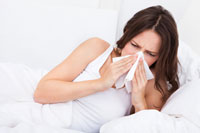What’s Causing Allergic Reactions in Your Treasure Coast Home?
When you live in Florida, allergic reactions can be a real problem for most of the year. While you may think you’re safe in your house, a variety of allergens can reside in your home that will exacerbate or trigger allergic reactions. Here are a few of the most common allergens that can be found in your home, and ways to alleviate them.
Dust Mites
Among the most common allergen to trigger allergic reactions and asthma, dust mites are microscopic insects that feed on dead skin flakes and thrive in homes with high humidity and temperatures over 70 degrees. Their favorite places are soft furnishings and bedding, but they can be found anywhere in your home, including your carpet. Fortunately, there are ways to control the dust mite population in your home.
- Clean with a HEPA filter-equipped vacuum.
- Keep your home at or below 70 degrees.
- Wash bedding every seven to 10 days in hot water, preferably over 130 degrees.
Pets
Dogs and cats are notorious for causing allergic reactions and asthma attacks. Their fur and dander will trigger allergies within 30 minutes of exposure. If you just can’t part with your furry friends, there are a few things you can do to help alleviate symptoms.
- Clean frequently using a HEPA vacuum, especially if you have more than one pet.
- Brush your dog or cat frequently (outside) to minimize shedding.
- Use a high-efficiency air filter with your air conditioner or furnace.
- Keep pets out of rooms frequented by allergy sufferers.
Mold
Another common problem in Florida, mold thrives in humid and dark environments, which is why you typically find it in bathrooms, basement laundry rooms and crawl spaces. Here’s how to prevent mold and mildew from forming in your home and causing allergic reactions.
- Keep your A/C at 70 degrees or below.
- Purchase a dehumidifier to help remove excess humidity.
- Promptly clean up any water or dampness that gets into your home, whether through leaky pipes, the basement foundation, or poorly sealed windows and doors. Address the issue to stop the leak.
- If mold does build up in your home, use a solution of 5 percent bleach, detergent and water to clean the area thoroughly.
For more information on dealing with allergens in your home or other HVAC issues, contact the experts at NisAir Air Conditioning and Heating. We’ve been proudly serving Treasure Coast communities since 1973.

